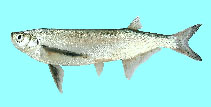Upload your photos and videos
Pictures | Google imagePelecus cultratus
Picture by Otel, V.
Pictures | Google imagePelecus cultratus
Picture by Otel, V.
Azerbaijan country information
Common names:
Tschekhon
Occurrence: native
Salinity: freshwater
Abundance: | Ref:
Importance: | Ref:
Aquaculture: | Ref:
Regulations: | Ref:
Uses: no uses
Comments: Also Ref. 115212.
National Checklist:
Country Information: https://www.cia.gov/library/publications/resources/the-world-factbook/geos/aj.html
National Fisheries Authority:
Occurrences: Occurrences Point map
Main Ref: Muus, B.J. and P. Dahlström, 1968
National Database:
Occurrence: native
Salinity: freshwater
Abundance: | Ref:
Importance: | Ref:
Aquaculture: | Ref:
Regulations: | Ref:
Uses: no uses
Comments: Also Ref. 115212.
National Checklist:
Country Information: https://www.cia.gov/library/publications/resources/the-world-factbook/geos/aj.html
National Fisheries Authority:
Occurrences: Occurrences Point map
Main Ref: Muus, B.J. and P. Dahlström, 1968
National Database:
Common names from other countries
Classification / Names Common names | Synonyms | Catalog of Fishes(genus, species) | ITIS | CoL | WoRMS | Cloffa
Teleostei (teleosts) > Cypriniformes (Carps) > Leuciscidae (Minnows) > Leuciscinae
Etymology: Pelecus: Greek, pelekys = hatchet (Ref. 45335).
More on author: Linnaeus.
Etymology: Pelecus: Greek, pelekys = hatchet (Ref. 45335).
More on author: Linnaeus.
Environment: milieu / climate zone / depth range / distribution range Ecology
Freshwater; brackish; pelagic; anadromous (Ref. 51243); depth range 20 - ? m (Ref. 9696). Temperate; 10°C - 20°C (Ref. 2059); 63°N - 36°N, 8°E - 73°E
Distribution Countries | FAO areas | Ecosystems | Occurrences | Point map | Introductions | Faunafri
Eurasia: Black Sea, Caspian Sea and Aral Sea basins; Baltic basin from Vistula to Neva drainages, southern Sweden and Finland, Lakes Ladoga and Onega. Occasionally on Baltic coast west of Vistula and on Finnish coast north of 61°N (Ref. 59043).
Length at first maturity / Size / Weight / Age
Maturity: Lm ? range ? - ? cm
Max length : 60.0 cm TL male/unsexed; (Ref. 556); common length : 25.0 cm TL male/unsexed; (Ref. 556); max. published weight: 2.0 kg (Ref. 556); max. reported age: 11 years (Ref. 27368)
Max length : 60.0 cm TL male/unsexed; (Ref. 556); common length : 25.0 cm TL male/unsexed; (Ref. 556); max. published weight: 2.0 kg (Ref. 556); max. reported age: 11 years (Ref. 27368)
Short description Identification keys | Morphology | Morphometrics
Mouth oblique. Low wavy lateral line. Belly with a sharp edge (Ref. 35388).
Adults shoal in lower reaches of large rivers and in the eastern Baltic, the Caspian Sea and the Aral Sea. They spawn in spring in midstream (Ref. 9696) and return to estuaries to forage immediately after spawning (Ref. 59043). Juveniles may migrate to estuaries during first summer (Ref. 59043). Feed on zooplankton, terrestrial invertebrates and small fish (Ref. 59043).
Life cycle and mating behavior Maturity | Reproduction | Spawning | Eggs | Fecundity | Larvae
Open water egg scatterers.
Main reference
Upload your references | References | Coordinator | Collaborators
Muus, B.J. and P. Dahlström, 1968. Süßwasserfische. BLV Verlagsgesellschaft, München. 224 p. (Ref. 556)
Threat to humans
Harmless
Human uses
Fisheries: minor commercial
FAO(Aquaculture systems: production; Fisheries: production; publication : search) | FishSource | Sea Around Us
More information
Population dynamics
Growth parameters
Max. ages / sizes
Length-weight rel.
Length-length rel.
Length-frequencies
Mass conversion
Recruitment
Abundance
Growth parameters
Max. ages / sizes
Length-weight rel.
Length-length rel.
Length-frequencies
Mass conversion
Recruitment
Abundance
Life cycle
Reproduction
Maturity
Fecundity
Spawning
Spawning aggregations
Eggs
Egg development
Larvae
Larval dynamics
Reproduction
Maturity
Fecundity
Spawning
Spawning aggregations
Eggs
Egg development
Larvae
Larval dynamics
Anatomy
Gill area
Brain
Otolith
Gill area
Brain
Otolith
Physiology
Body composition
Nutrients
Oxygen consumption
Swimming type
Swimming speed
Visual pigments
Fish sound
Diseases & Parasites
Toxicity (LC50s)
Body composition
Nutrients
Oxygen consumption
Swimming type
Swimming speed
Visual pigments
Fish sound
Diseases & Parasites
Toxicity (LC50s)
Human related
Aquaculture systems
Aquaculture profiles
Strains
Ciguatera cases
Stamps, coins, misc.
Aquaculture systems
Aquaculture profiles
Strains
Ciguatera cases
Stamps, coins, misc.
Tools
E-book | Field guide | Length-frequency wizard | Life-history tool | Point map | Classification Tree
| Catch-MSY |
Special reports
Download XML
Internet sources
Alien/Invasive Species database | Aquatic Commons | BHL | Cloffa | BOLDSystems | Websites from users | Check FishWatcher | CISTI | Catalog of Fishes(genus, species) | DiscoverLife | ECOTOX | Faunafri | Fishtrace | GenBank(genome, nucleotide) | GloBI | GOBASE | | Google Books | Google Scholar | Google | IGFA World Record | MitoFish | National databases | Otolith Atlas of Taiwan Fishes | Public aquariums | PubMed | Reef Life Survey | Scirus | SeaLifeBase | Tree of Life | Wikipedia(Go, Search) | World Records Freshwater Fishing | Zoological Record
Estimates based on models
Phylogenetic diversity index (Ref. 82804): PD50 = 1.0000 [Uniqueness, from 0.5 = low to 2.0 = high].
Bayesian length-weight: a=0.00724 (0.00358 - 0.01465), b=3.14 (2.97 - 3.31), in cm Total Length, based on LWR estimates for this (Sub)family-body shape (Ref. 93245).
Trophic level (Ref. 69278): 3.6 ±0.53 se; based on food items.
Resilience (Ref. 120179): Medium, minimum population doubling time 1.4 - 4.4 years (K=0.20; tmax=11).
Fishing Vulnerability (Ref. 59153): Moderate to high vulnerability (50 of 100).




